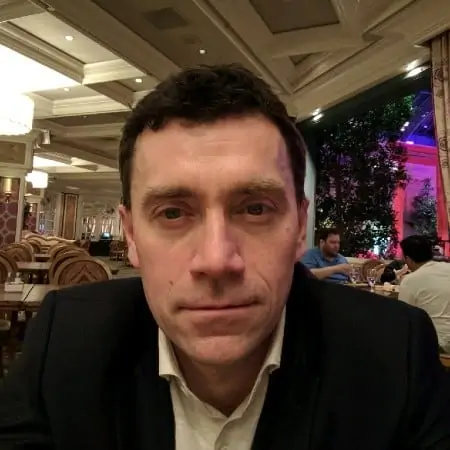At Supply Chain Game Changer we believe in sharing experiences and expertise from people in every industry and from across the globe. As such we have introduced our “Seasoned Leadership in Action™” Interview series. This interview is with Steve Radewych, Senior Vice President of Supply Chain.
I have known Steve for a couple of decades. He brings a wealth of international, diverse industry, and broad based Supply Chain experience to any role he takes on.

Steve has impressed me with his unmitigated willingness to dive into any situation, anywhere in the world, to help resolve problems and lead people out of difficult situations. Steve also has an incredible personality that makes him very approachable and makes people very comfortable in working with him. This is a fantastic personality trait particularly for those working in the challenging field of Supply Chain.
I’ve had the privilege of providing a job reference for Steve in the past. This is one way in which I show my endorsement for Steve as a great Supply Chain leader.
Thank you Steve for your friendship, your support of Supply Chain Game Changer, and taking the time to share your experiences and expertise with us.
Here is our interview with a great friend and world class leader, Steve Radewych!
Tell our readers a little about your background and experience?
I have been working in the field of supply chain for 25 years, covering a wide variety of manufacturing and infrastructure industries that were all global in nature.
What are some of your greatest achievements in Business?
In no particular order:
- Participating in large supply chain transformational programs that drove significant improvement in cost, delivery, and quality performance.
- Facilitating the supply chain integration of new acquisitions, including the domain of processes, systems, and culture/people
- Establishing a global supply chain function for a geographically disperse industrial manufacturing firm, which had been functioning under a fragmented, sub-optimized supply chain structure.
- Participating (twice) in the sale process of a global firm, a critical part of which was ‘selling’ the value that the supply chain brought, and would bring, to the future value of the organization.
- Spearheading lean/six sigma programs on a large scale, both across sites and the supply chain function, helping build a continuous improvement mindset.
- Large scale remapping of sourcing strategies to enable global (multi-geography) sourcing for a multi-geography manufacturing footprint.
How has Business and Supply Chain changed over the course of your career?
- There is a far greater degree of globalization along with the ability to source from many more locales as a consequence of competitive proliferation.
- As a consequence of the prior point, the importance of logistical networks and strategies in support of global supply chains.
- The increased importance of supply chain risk analysis and continuity plans as a result of natural and man made supply chain disruption occurrences.
- Significant shift to criticality of data and data analytics that support/influence supply chain strategies.
- The growing importance of skill sets in the supply chain domain – witnessed by the growth in academic programs that focus purely on the discipline of supply chain.
- The growing importance of the supply chain executive in the senior management ranks – given the supply chain/network complexity that has evolved over the last several decades.
What are some of the lessons you learned in your career that you would like to share for others to learn from?
- Supply chain is an ever evolving field – you never know it all, and be prepared to be confronted with something you were not expecting
- Expertise is found across your team – don’t underestimate the experiences that those around you can contribute to make a difference
- Act on facts/data, but don’t get mired in paralysis trying to determine the perfect strategy/plan
- The importance of social and ethical sourcing – make it a mindset, because its not going away!
- Know who your customers are – not just external, but within your organization as well
- Define the criteria for success – and make sure you, your team, and any stakeholders are understanding (and aligned) to those objective.
What challenges facing the world are important to you?
Today…how can supply chains accommodate the apparent growing tide of protectionism that is propagating across national boundaries
What is the role of Business, Supply Chain and Change Leadership in addressing these challenges?
- Businesses must lobby to ensure the voice of industry is heard and understood.
- Businesses must take an active role in contingency planning to ensure disruption or impact as a result of protectionism is minimized
- Businesses need to continue to recognize that global markets will necessitate the need for global supply chains
- Operations must ensure there are no single points of complete dependency – whether a product or service…plan redundancy to ensure agility/flexibility.
- Operations must consider alternative approaches to continued flow of product or services – including partnering with entities that may not be subject to the same barrier conditions
- Supply chains must ensurethat they can be resilient to protectionist barriers
- Supply chains need the right mix of localization in a global network
- Change Leadership needs to ensure that individuals in an organization are capable of interpreting the impacts/dynamics of national policies
- Change Leadership must facilitate, in the most extreme cases, the redirection of talent in the event that barriers drive the need to cease operations in designated locales
- Business/Supply Chain/Change Leadership must all recognize that conditions are not static – therefore what strategy enables the greatest flexibity?
What are you working on these days?
Establishing a global supply chain function for a manufacturing firm with 15 locations spanning five continents
What advice would you give people who have a career in, or who are considering joining, Business and/or Supply Chain?
- Be accommodating to change – especially if you see yourself employed in a global context
- Consider how you will keep yourself knowledgeable in the areas that are of interest to you
- Don’t underestimate the value of all forms of communication
- For a global setting – get to know the cultures you will be interfacing with
- Explore the value of a diverse network
How can people contact Steve Radewych?
I can be reached through my LinkedIn profile.

